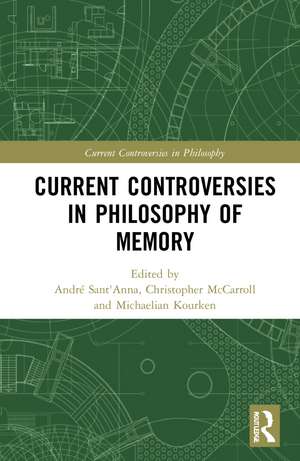Current Controversies in Philosophy of Memory: Current Controversies in Philosophy
Editat de André Sant'Anna, Christopher Jude McCarroll, Kourken Michaelianen Limba Engleză Paperback – 29 ian 2024
I. What is the relationship between memory and imagination?
II. Do memory traces have content?
III. What is the nature of mnemonic confabulation?
IV. What is the function of episodic memory?
V. Do non-human animals have episodic memory?
VI. Does episodic memory give us knowledge of the past?
The book constitutes a valuable resource for researchers, teachers, and students alike. For researchers, it provides an up-to-date discussion of some of the main theories, arguments, and problems in the area. For teachers, the book can supply the readings for an entire course, or particular sections can provide the readings for specific units within a broader philosophy of memory course. For students, the book offers accessible discussions of some of the most recent topics in the philosophy of memory, which, when taken together, serve as a well-rounded introduction to the area.
| Toate formatele și edițiile | Preț | Express |
|---|---|---|
| Paperback (1) | 369.73 lei 6-8 săpt. | |
| Taylor & Francis – 29 ian 2024 | 369.73 lei 6-8 săpt. | |
| Hardback (1) | 1330.04 lei 6-8 săpt. | |
| Taylor & Francis – 29 iul 2022 | 1330.04 lei 6-8 săpt. |
Preț: 369.73 lei
Nou
Puncte Express: 555
Preț estimativ în valută:
70.76€ • 73.60$ • 58.41£
70.76€ • 73.60$ • 58.41£
Carte tipărită la comandă
Livrare economică 14-28 aprilie
Preluare comenzi: 021 569.72.76
Specificații
ISBN-13: 9780367432799
ISBN-10: 036743279X
Pagini: 274
Ilustrații: 2
Dimensiuni: 152 x 229 mm
Greutate: 0.45 kg
Ediția:1
Editura: Taylor & Francis
Colecția Routledge
Seria Current Controversies in Philosophy
Locul publicării:Oxford, United Kingdom
ISBN-10: 036743279X
Pagini: 274
Ilustrații: 2
Dimensiuni: 152 x 229 mm
Greutate: 0.45 kg
Ediția:1
Editura: Taylor & Francis
Colecția Routledge
Seria Current Controversies in Philosophy
Locul publicării:Oxford, United Kingdom
Cuprins
Editors’ introduction Part I: What is the relationship between memory and imagination? 1. Remembering, imagining, and memory traces: Toward a continuist causal theory 2. The relation between memory and imagination: A debate about the right concepts Part II: Do memory traces have content? 3. Remembering without a trace? Moving beyond trace minimalism 4. Distributed traces and the causal theory of constructive memory Part III: What is the nature of mnemonic confabulation? 5. An explanationist model of (false) memory 6. Towards a virtue-theoretic account of confabulation Part IV: What is the function of episodic memory? 7. Episodic memory: And what is it for? 8. Episodic memory is not for the future Part V: Do non-human animals have episodic memory? 9. Episodic memory in animals: Optimism, kind scepticism and pluralism 10. What does it take to remember episodically? Part VI: Does episodic memory give us knowledge of the past? 11. The epistemology of episodic memory 12. You don't know what happened
Notă biografică
André Sant’Anna is a McDonnell Postdoctoral Fellow in the Department of Philosophy and the Philosophy-Neuroscience-Psychology Program at Washington University in St. Louis.
Christopher Jude McCarroll is Assistant Professor of Philosophy at the Institute of Philosophy of Mind and Cognition, National Yang Ming Chiao Tung University.Kourken Michaelian is Professor of Philosophy at the Université Grenoble Alpes, where he directs the Centre for Philosophy of Memory, and is a senior member of the Institut Universitaire de France.
Christopher Jude McCarroll is Assistant Professor of Philosophy at the Institute of Philosophy of Mind and Cognition, National Yang Ming Chiao Tung University.Kourken Michaelian is Professor of Philosophy at the Université Grenoble Alpes, where he directs the Centre for Philosophy of Memory, and is a senior member of the Institut Universitaire de France.
Descriere
The 12 chapters cover 6 questions: I. What is the relationship between memory and imagination? II. Do memory traces have content? III. What is the nature of mnemonic confabulation? IV. What is the function of episodic memory? V. Do non-human animals have episodic memory? VI. Does episodic memory give us knowledge of the past?












